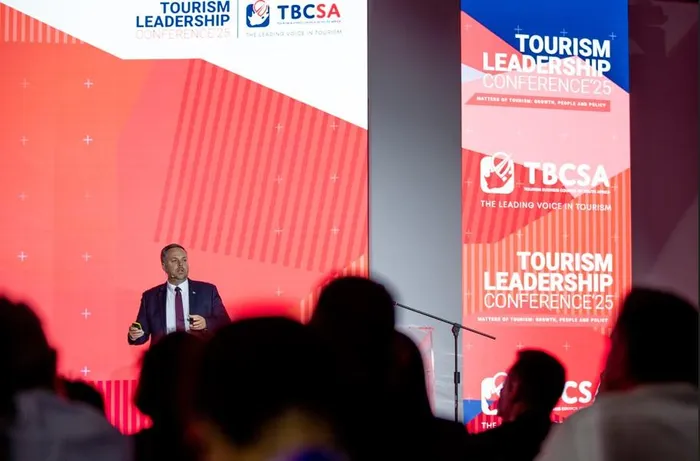South Africa to launch new digital visa application system ahead of G20 Summit
TOURISM

Minister of Home Affairs, Dr. Leon Schreiber, speaking at the Tourism Business Council of South Africa’s (TBCSA) Tourism Leadership Conference 2025 on Thursday.
Image: Supplied/Thabang Radebe/TBCSA
South Africa will roll out a new Electronic Travel Authorisation (ETA) system ahead of the G20 Leaders’ Summit in November, a move government says will remove long-standing visa bottlenecks that have constrained the country’s tourism growth.
The announcement comes as BDO South Africa’s Tourism Trends Report this week flagged that South Africa’s recovery continues to lag behind global and regional peers, despite a 14% rise in international tourist arrivals between January and July 2025, totalling 5.85 million visitors.
Unveiling the system at the Tourism Business Council of South Africa’s Leadership Conference on Thursday, Home Affairs Minister Leon Schreiber said the ETA formed part of government’s “Home Affairs @ Home” digital transformation agenda. The platform replaces paper-based visas with an online process that allows applicants to capture biometrics and receive approvals within hours.
Integrated with the Electronic Movement Control System (EMCS 2.0), the ETA will use biometric facial recognition at OR Tambo and Cape Town International Airports to cut waiting times and strengthen border security.
Schreiber said the reform was designed to end “manual, discretionary, paper-driven processes” that left applicants waiting weeks for outcomes.
“Fully online and automated, the ETA objectively measures whether a person qualifies. If the answer is yes, you get the visa. If not, you don’t,” Schreiber told Business Report.
Testing of the system begins at the end of September. A pilot will go live in October for delegates from China, India, Indonesia and Mexico – the four G20 members that require visas.
From November, it will extend to tourists from those countries, before expanding to all visa-required markets. Over time, the system will also apply to other visa categories and ports of entry.
Tourism contributes significantly to South Africa’s economy, generating R618.7 billion in 2024 and supporting 1.8 million jobs. That figure is expected to reach 1.9 million this year, with long-term potential of R900bn GDP contribution and 2.6 million jobs by 2035 if reforms are sustained.
Minister of Tourism, Patricia de Lille, noted that one of the most urgent reforms in the Tourism Growth Partnership Plan was ease of access, adding that visa policies have held the industry back for too long.
“That is why the new Electronic Travel Authorisation system (ETA) is a game-changer. Research shows that the ETA will add at least one million international arrivals every year and could generate between 80 000 and 100 000 new jobs," De Lille said.
"It is not just about technology. It is about opportunity, dignity, and livelihoods. It is about saying to the world: South Africa is open, welcoming, and ready to do business.”
TBCSA CEO, Tshifhiwa Tshivhengwa, said e-visas and the improvements of electronic infrastructure at the airports have been the priority issue for the tourism industry, in addition to waiving of visa requirements for additional markets.
“I am glad that the minister has announced that they are now implementing the ETA. At the airports, e-infrastructure is still an issue. The board of airline representatives and car rental associations speak of the issues they have and the airport infrastructure improvement that needs to happen,” he said.
“But we have made some big movements on issue number one. And I think we can simply say we are almost there. But we are not there yet. But we have made some huge significant movements when it comes to the issue of e-visa. We have not done much about the improvement of the e-infrastructure at the airports, it’s something that is ongoing, it’s going to take a bit of time.”
Momentum Investments chief economist, Sanisha Packirisamy, noted reforms underway to overhaul the tourism industry, including revising key skills list, work visa process reforms, e-visa for tourist entry, reforming visas to attract skills, and streamlining tourist visa system.
Packirisamy said strategies for growing tourism in South Africa should include expanding airlift, targeted marketing campaigns, boosting digital and AI-powered travel planning, growing sustainable and cultural tourism, and enhancing safety and security.
BUSINESS REPORT